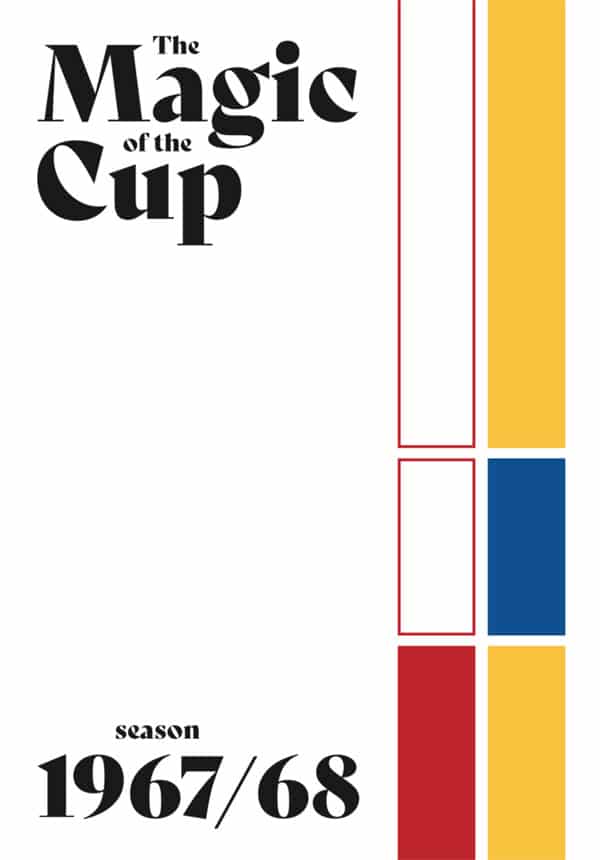It’s pretty much passed into the national – global – folklore that the Football Association’s Challenge Cup (FA Cup) is “the greatest cup competition in the world”, the one that transcends all others, that can captivate not just England, but the whole world.
 By Dave Bowler
By Dave Bowler
Perhaps that position – or more accurately, the importance of that position – has been a little diluted over the last 20 years or so, when it seems like every game, from a bounce match on Hackney Marshes to the World Cup final, is beamed live to every nook and cranny of the planet, but the FA Cup final in particular is still something very special, a Saturday afternoon where everything stops for that game.
The fact that, once upon a time, it was the only domestic club game that you could see live on television inevitably added lustre to it, but the final was only a part of what made the competition so special, a mere component rather than the be all and end all. It was the competition as a whole, the fact that the cup could be “the great leveller”, where non-league electricians could take the field with England internationals – and beat them – and where goals and saves that have survived the ages were scored and made.
Cup Magic
There always was something about the FA Cup that made it hyper-real, where every sense, every moment, every reaction was heightened, where it carried just that little bit more import, that longer lasting legacy. That is the very nature of Cup football of course, that there are no second chances to be had beyond a replay, where if you lose, you have to wait for the competition to come around again next year for another chance.
League football might ultimately be the best way to establish the finest team in the land, but it’s a marathon wherein a couple of bad days can be atoned for across the rest of the season. The FA Cup is death or glory. No half measures. It is sport at its most immediate, its most cut-throat, its most undeniably intense.
Once upon a time, football people used to talk of the league game as being their bread and butter. That wasn’t an altogether disparaging take on it because we all need the basics to survive, but it is redolent now of a different time. Looking back to the 1970s, league football was very different.
At the top end of it all, there was no Champions League to qualify for – only the champions made it into the European Cup – and so perhaps only the top four teams might qualify for any European football at all. With only two sides in the 22 team First Division getting relegated – increased to three in 1973/74 – it could mean that come February or March, a lot of teams were doing little more than treading water until season’s end.
Lower Leagues
In the lower divisions, there were no play-offs, the top three in Divisions One and Two going up automatically, the top four in the Fourth Division, relegation taking in the same numbers. Depending on how the leagues were panning out, it could make for two or three months of largely meaningless league fixtures.
In that light, bread and butter was a direct contrast to the champagne and strawberries that the FA Cup offered, even if that wasn’t always quite so obvious on a muddy pitch in Newcastle in darkest January. It made it all the more important that you kept your season alive by virtue of a proper cup run, though that could look very different depending upon who you were.
Non-League Glory
For the non-league sides, qualifying for the competition proper was the goal, and not just because it meant performing at a new level where players could perhaps put themselves in the shop window for a move into the full-time game. For the clubs themselves, it meant an opportunity to take a place on the national stage, bolster their reputation and, perhaps, put themselves into a position where they might achieve election into the Football League itself.
There was no automatic promotion from the non-league game to Division Four back then, but instead a league meeting where the bottom four sides in the Fourth Division had to apply for re-election to the league and where non-league sides could lobby to take their place, the decision going to a vote.
1970s
The 1970s were to prove just how big a role national exposure could play in a club finding its way to the full-time game, the exploits of both Hereford United and Wimbledon seeing them ride the crest of that wave into the Football League.
For the Third and Fourth Division outfits, little has changed since the ‘70s really. Then, as now, it was all about coming through those first two rounds, avoiding any banana skins, then hunkering down around the radio on the Monday lunchtime after that second round win and hoping that, after FA Secretary Ted Croker had uttered the magic words “Manchester United will play…”, their number would come up.
Payday
Getting a huge draw against one of the elite and having the chance to go to Old Trafford, Anfield, Goodison or Highbury was not only the dream of the players and the fans, it was the escape route from penury that the chairman and his bank manager feverishly hoped for.
A huge payday like that and all the pressure on a small club’s financial position could be lifted for the next 12 months – any cup tie meant a 50/50 split of the gate receipts between the clubs after the home team had been allowed to deduct relevant matchday expenses, a financial windfall that could prove transformative.
In the top two divisions, especially for those sides becalmed in mid-table, an FA Cup run was what kept their seasons alive, kept the fans interested, kept them coming through the turnstiles and collecting their ticket stubs and programme vouchers in case that was a passport to a Wembley ticket.
Silver
If a mid-table also-ran fell at the third round hurdle, you would hear their fans saying that the season was over and, in those days before all-seater stadia, when season tickets were much less prevalent than they are today, that could mean a precipitous fall off in attendances.
That could prove disastrous in an era where ticket money was pretty much the major source of revenue. Going deep into the competition could prolong interest in a season into March or beyond, a crucial consideration. Little wonder there was no squad rotation nonsense then.
Perhaps it was because it was so gladiatorial in nature, the delivery of the thumbs up or the thumbs down at the final whistle, that the FA Cup was seen for so long as THE trophy to win, the one that mattered most. Maybe it was simply because it was the oldest competition of them all, the one from which all others, cup and league, sprang.
Upsets
The opportunity for prince and pauper to take the same stage, and for the pauper to sometimes come out on top, was undeniably romantic, but there was more to it for the FA Cup had everything going for it. There was the distant glamour of ending the arduous road at the hallowed Wembley Stadium that built the legend, and the fact that, after 1910 when the FA brought the current trophy into being, teams were competing for what is the most beautiful piece of silverware in all of sport.
These things and more created what became known – and then became cliché – as the “magic of the cup”. The Wanderers of 1872, Preston’s invincibles in 1889, the “white horse” final of 1923, Cardiff defeating Arsenal at Wembley, Wolves and their monkey glands, the Matthews final, countless giantkillings up and down the country, it all combined to give the FA Cup absolute primacy on the domestic – and global – stage.
Shankly
The importance of the FA Cup was never better summed up than by Bill Shankly when his Liverpool side defeated Leeds United in the 1965 final, the first time that the Reds had carried off the trophy.
Even though they had won the First Division a year earlier, Shankly saw winning the FA Cup as the culmination of a crusade, wiping away a stain from the reputation of the Anfield club, addressing a failure that he simply could not accept. That was how much the FA Cup mattered to a man who understood football as well as anyone ever has.
Indeed, winning the cup was so important that when his Liverpool did it for a second time in 1974, Shankly concluded that he had achieved enough and shuffled off into retirement.
Kop Idols
In the Newcastle team beaten that day by Liverpool were two future Kop idols, one of them, Alan Kennedy, the player who would go on to score the winner in two European Cup finals for them, also winning countless league titles too. But here’s what he has to say about the FA Cup.
“It is a fantastic competition, it brings everything together. It starts in the summer, July or August and I’ve done that, I’ve played in those early rounds when I finished my career in non-league football. It’s fantastic, totally different to anything else. When an FA cup game comes around, people are more aware of it, they’re excited by it.
So many teams and players have made their name in it down the years. I remember Blyth Spartans getting into the proper rounds and drawing Wrexham, playing the game at St James’ Park. I watched the game and I remember thinking, “This is fantastic”. Great football, hell for leather, and these guys getting to play on that pitch and giving it everything.
“There’s a sparkle about it that nothing else has. It lifts the players from the mundane league games, whatever league you’re in. Everybody is stirred by it. A good run in the cup, it creates excitement, it brings a bit of magic, it creates some revenue, which is an important lifeline for the smaller clubs too. It puts people into the limelight, even just for a moment. If you’ve ever played in the FA Cup, even in the qualifying rounds, you should be proud that you’ve at least had a go in the competition.”
Amen to that.
